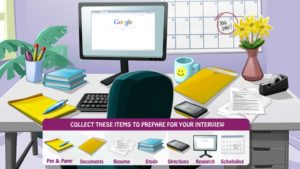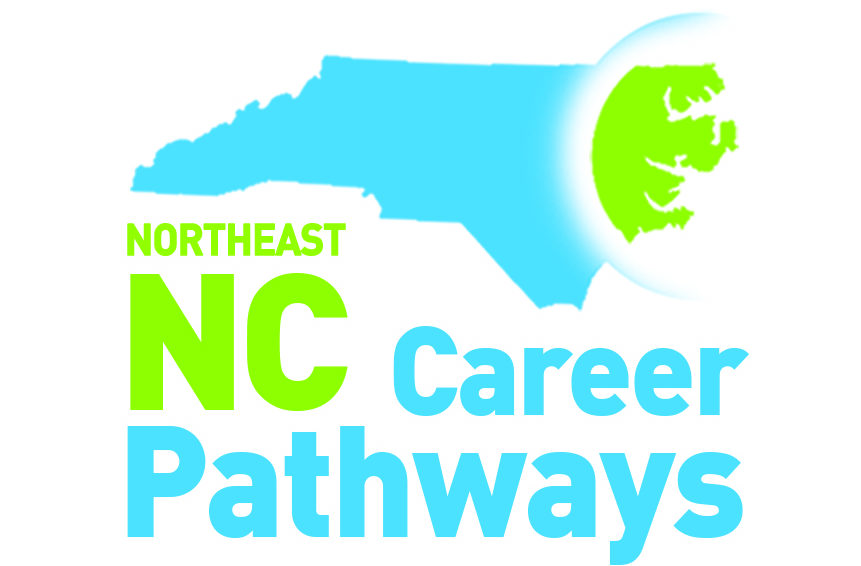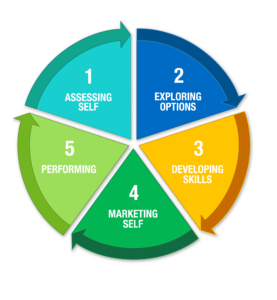Step Four – Marketing Yourself
Once you have identified your career goals, developed skills and earned credentials , it’s time to “sell” yourself. All that work doesn’t help you if you don’t market yourself well. Check out these important things to consider when marketing yourself, along with resources to help you through.

Career Advising
Having someone who is knowledgeable about career development, aware of local labor market information and able to help you through the process of becoming career ready will be especially helpful to you. For middle and high school students, schools and districts offer career counseling and guidance in many ways, including through Career and Technical Education (CTE) departments. Most Community Colleges and Universities in North Carolina also offer career services. All North Carolinians (age 16 and over) can utilize free career advising services through their local NCWorks Centers. Sometimes community partners (like Boys & Girls Clubs or Department of Social Services) offer career advising and planning opportunities for their participants.
Applications and Resumes
Many employers will request a resume and a more detailed application. It’s a good idea to complete a sample application to guide you in completing future applications. You will need dates for your prior experience (paid and unpaid) and at least three references (who are not relatives).
Sample Application Template (from www.wordtemplatesonline.net)
“As a high school student with limited work experience, it can be hard to know how to organize your resume, and what to include. By focusing on your education, volunteer, and extracurricular experience, you can craft a strong resume that will stand out to an employer.” — Alison Doyle, the balance careers —
Working with your Career Advisor can be really helpful when creating a resume. And you should always have someone else look over your resume before you print or send it, to catch any errors.
Social Media
Not only can Social Media help you find a job, but it can keep you from getting a job too. Be mindful of what you post publicly and privately on Social Media that could signal to an employer that you may not be an ideal employee. This may include photos or information about drinking and/or drugs but also rude or intimidating comments or photos. Seventy (70%) percent of employers in a Career Builder survey reported screening candidates via social media during the hiring process. Read more here.

Social media is a great way to market yourself and build your network. On platforms like Facebook, Instagram and Twitter, follow companies you want to work for and join groups specific to the area where you want to live/work. LinkedIn is basically a secondary resume for employers, so you want to be sure to spend a lot of time getting it right. Especially for students who don’t have a lot of work experience yet, LinkedIn can help you network with people in the industry you are interested in, and the ability to have teachers/coaches/etc. write public recommendations is really helpful. Be sure to include volunteer work, extracurricular activities, clubs you are part of and your accomplishments.
LinkedIn Profile Checklist for Students
Interview Skills
Interview Skills are a really important part of career development. Knowing what to say and how to say it can help you make the best first impression, and potentially land you the job! Check out the resources below to help get prepared. Be sure to practice the interview skills you’ve learned before the big day. You can do this with your career advisor, your friends or family, in front of a mirror or recorded. Here is an practice interview evaluation you can use.
 Getting ready for a job interview can be a stressful task. Being prepared and having the right information can be critical to making a good impression and landing the job. Learn about important tips and techniques for preparing yourself for the big day with this helpful guided walk-through. (via NCBioNetwork)
Getting ready for a job interview can be a stressful task. Being prepared and having the right information can be critical to making a good impression and landing the job. Learn about important tips and techniques for preparing yourself for the big day with this helpful guided walk-through. (via NCBioNetwork)
Networking
“Networking has emerged as one of the primary ways to land a job. This process is a way for you to establish relationships with individuals who can introduce you to new opportunities that you can’t find on a job board. Networking can help you with career planning by providing you with a better understanding of various careers as well as information about numerous companies that you may not find by surfing the web. With this information, your career planning process can be based on direct information rather than rumors or biased company literature.” — Study.com
Use the worksheet below to help you think about the network you already have, and how you can improve it. Make the effort to connect with people and let them know that you are looking for work.
Networking is not just about in-person interactions, you can create a network online as well. It’s important to use LinkedIn to your advantage, even while in high school. Learn more here.


:strip_icc():format(webp)/high-school-resume-template-2063264_FINAL-76710e983caf4d20bc529b56569da52d.png)

